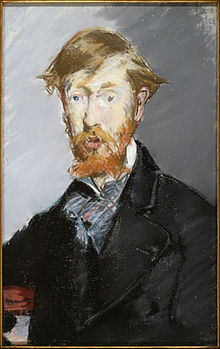George Moore
George Augustus Moore (born February 24, 1852 in Ballyglass , Ireland , † January 21, 1933 in London ) was an Irish writer and art critic .
Life
Moore, whose father was a Member of Parliament, came from a wealthy family. Moore received his upbringing by private tutors and later at St. Mary's College in Oscott, near Birmingham . After the death of his father in 1870, he decided - now financially independent - to go to Paris to study art. In March 1873 he enrolled at the Ecole des Beaux-Arts as a student of Cabanel , and later switched to the Académie Julian . After only three years, Moore decided to give up painting again and from 1876 turned entirely to writing. Moore met Mallarmé through Auguste Villiers de L'Isle Adam and through him, in turn, met Édouard Manet , who portrayed Moore several times during this time. In the Café de la Nouvelle Athènes he had also met Pissarro , Degas , Renoir , Monet , Daudet , Turgenev and above all Émile Zola , whose naturalism particularly influenced him.
In 1880 Moore settled in London and published his first poems. In 1883 he published his first novel, A Modern Lover , which was banned in England due to immorality. With his novel A mummer's wife , published in 1885, Moore created the first realistic-style novel in England. In the following novels, Moore addressed topics such as prostitution, extramarital sex and lesbian love and thus provoked the public. His books Impressions and Opinions (1891) and Modern Painting (1893) brought the English audience closer to Impressionist painting for the first time. From 1901 Moore lived in Dublin . Together with Yeats he wrote Diarmuid and Grania for the Irish Literary Theater and was also involved in practical theater work in the context of the Irish Renaissance . In the following years he dealt with Irish culture ( Celtic Revival ) and Ireland was the setting for the novel The Lake (1905) and some short stories. In these short stories, Moore also attacked the Catholic Church, which led to problems with the publication of his work in Irish. His short stories also inspired the young James Joyce . Because of his commitment to the Irish language, Moore is considered a co-founder of modern Irish literature. The lyrical-melodic style of his late work makes his "Ohr-Erzählungen" appear as oral lectures for an imaginary listener.
In 1911 Moore finally settled in London. From here Moore made many trips to Paris and in 1913 went to Jerusalem to prepare his novel The Brook Kerith , which was published in 1916. The book was based on the assumption that Christ did not die on the cross, but was nursed back to health afterwards, and later went to India to be enlightened there. This novel also met with violent reactions.
Moore's novella The Singular Life of Albert Nobbs , published in 1918, was later dramatized by Simone Benmussa (world premiere in 1977) and adapted as a feature film by director Rodrigo García with Glenn Close in the leading role ( Albert Nobbs , 2010).
George Moore died in London in 1933 at the age of 81. The urn with his ashes was buried on Castle Island in Lough Carra in Ireland not far from the ruins of his parents' house.
In many of his works, Moore thematized the fate of women, such as B. in his novel A mummer's wife , in which he depicts extremely realistically the social decline of a woman caused by self-destruction through alcohol. Another topic for Moore was the British Boer War , against which he repeatedly spoke out.
Works
- A modern lover (1883)
- A mummer's wife (1885)
- A drama in muslin (1886) (German: A drama in muslin )
- Spring Days (1888)
- Confessions of a Young Man (1888)
- Vain fortune (1890)
- Esther Waters (1894) (German: Esther Waters )
-
Esther Walters . (1895)
- Esther Walters . Heinemann, London 1932
- Evelyn Innes (1898)
-
The Untilled Fields , T. Fisher Unwin, London 1900.
- The Untilled Fields , Tauchnitz, Leipzig 1903.
- Literature and the Irish language (1901)
- Sister Theresa (1901)
- Memoirs of My Dead Life (1906) (German: From dead days , online )
- Memories of the Impressionists (1907), online
- The apostle (1911)
- A Storyteller's Holiday (1918)
- Paris Stories (1926) , online
- The passing of Essenes (1930)
- Urban and countryside
literature
- Edward Aveling : Esther Walters. An English novel by George Moore . In: The new time . Revue of intellectual and public life. 13.1894-95, 1st volume (1895), issue 13, pp. 405-411 digitized
Web links
- Literature by and about George Moore in the catalog of the German National Library
- Works by George Moore in the Gutenberg-DE project
- George Augustus Moore in the Encyclopædia Britannica
Individual evidence
- ↑ Cf. Heinz Kosok: History of Anglo-Irish Literature . Schmidt Verlag, Berlin 190, ISBN 3-503-03004-2 , p. 94.
| personal data | |
|---|---|
| SURNAME | Moore, George |
| ALTERNATIVE NAMES | Moore, George Augustus (full name) |
| BRIEF DESCRIPTION | Irish writer |
| DATE OF BIRTH | February 24, 1852 |
| PLACE OF BIRTH | Ballyglass , Ireland |
| DATE OF DEATH | January 21, 1933 |
| Place of death | London |

